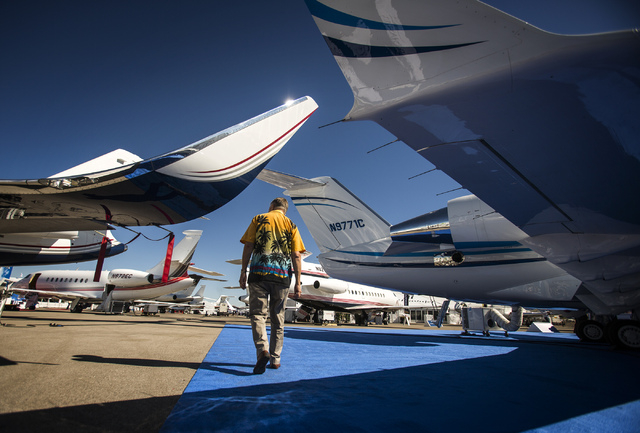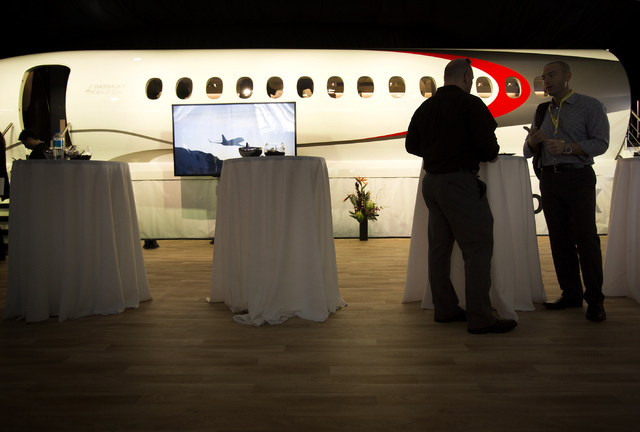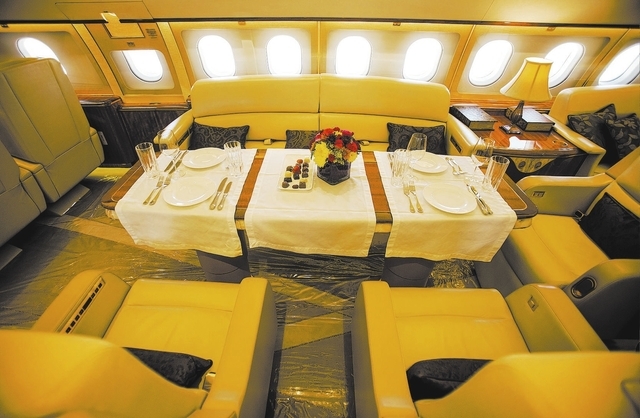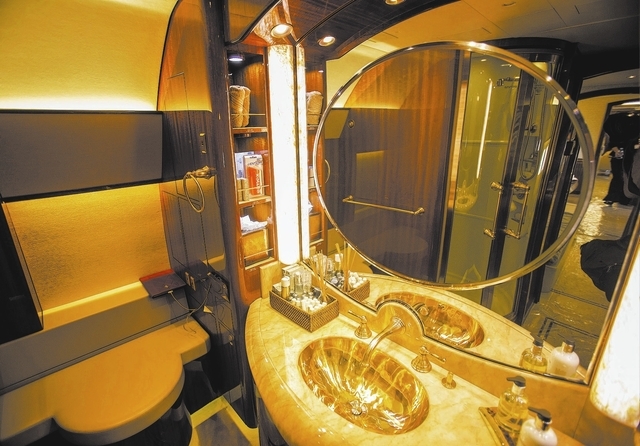Private jets on display in Las Vegas come with luxury touches, lofty prices
The Embraer Legacy 1000 was outfitted with a few more luxury touches than the average showroom: place settings of Christofle china, fresh-cut flowers in artsy vases and a bottle of Moet champagne in a bucket.
Then again, few products carry the $53 million list price of the Legacy, a version of the Brazilian company’s much more spartan E-190 airliner decked out to billionaire standards.
Not every company showing off a plane at the National Business Aviation Association convention took curb appeal that far. Many chose to play up other amenities: cushy leather seats, wood paneling and lavatories big enough to turn around in without hitting something.
The private jet industry is starting to emerge from several rough years. Exhibitors at the three-day convention, which started Tuesday split at the Las Vegas Convention Center and the Henderson Executive Airport, describe a “new reality.”
“It has been a challenging market for everybody,” said David Velupillai, marketing director for Airbus Corporate Jets.
The company’s centerpiece was the private version of the A319 airline, which may feel claustrophobic when fitted with 145 seats for Spirit Airlines but almost big enough for touch football in the 19-seat private model. There’s enough room in the planes, which have a $87 million list price, that buyers can bring in their own interior designers and create a bedroom, Velupillai said.
Sizing things up, Don Dwyer, managing partner of Guardian Jet, a consulting and brokerage firm in Guilford, Conn., said, “Has the market recovered to where it was? No,” said “But it is improving and that is the new reality.”
Some observers say the market has achieved balance unseen for years.
“Some other people will tell you it is still a down, miserable market. Not to us,” said Christopher Hollingsworth of the brokerage Jetcraft.
Many showgoers said private jet sales had grown into a bubble during the past decade; some people flipped them as order books grew larger and delivery times lengthened. The widely quoted industry outlook compiled annually by Honeywell’s aerospace division predicted as many as 1,300 planes would be delivered in 2008.
This year, however, the forecast calls for 600 to 625 deliveries. Growth in the coming years is pegged in single-digit percentages. The industry’s profile closely resembles Las Vegas’ recent real estate market: boom, bust, gradual recovery.
The private jet industry briefly had an image crisis; some saw the planes as symbols of excessive consumption amid the worst economic downturn since the 1930s. This was highlighted when auto company CEOs took corporate jets to a congressional hearing to request a federal government bailout.
Now, however, industry insiders say the stigma as fading as the economy improves and as manufacturers and brokers come to believe that private jets improves companies’ efficiency.
“The reality is that the vast majority of corporate jets are used as business tools,” Velupillai said.
They allow executives to visit several locations in a day, rework a schedule if necessary and essentially run an office in the sky.
The new Lear 75, for example, is wired for meetings. An iPod can be plugged into a master connection, with the files showing up on other screens in the cabin.
“It’s all about saving time and being productive,” said Phil Nasskau, a spokesman for Bombardier, which makes Learjets.
Several manufacturers responded to the slow markets by bringing out new or updated models that promise lower operating and maintenance costs. The Lear 75, for example, cuts fuel consumption and includes and instrument panel with synthetic vision, so pilots can see the terrain on a screen when visibility through the window is low or nonexistent.
Other companies bought used planes to refurbish and resell at well-below-new-plane prices. Elliot Aviation, based in Moline, Ill., showed a Beechcraft King Air 350 twin-engine turboprop, once used as an air ambulance, completely redone to corporate standards. The plane was priced at $2.9 million. By contrast, the latest King Air model costs $7.3 million.
Cleveland-based Nextant remanufactures certain jet models so completely that it puts its name on the planes once the work is done.
Contact reporter Tim O’Reiley at toreiley@reviewjournal.com or at 702-387-5290.




















